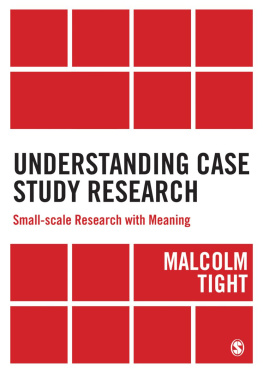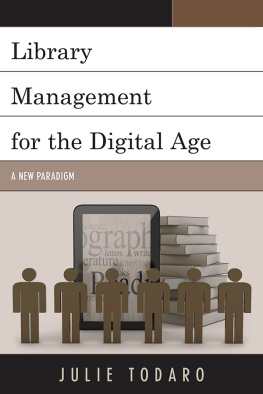Library Management Problems Today
Library Management Problems Today
Case Studies
Edited by Wayne Disher
ROWMAN & LITTLEFIELD
Lanham Boulder New York London
Published by Rowman & Littlefield
An imprint of The Rowman & Littlefield Publishing Group, Inc.
4501 Forbes Boulevard, Suite 200, Lanham, Maryland 20706
www.rowman.com
6 Tinworth Street, London SE11 5AL, United Kingdom
Copyright 2021 by The Rowman & Littlefield Publishing Group, Inc.
All rights reserved. No part of this book may be reproduced in any form or by any electronic or mechanical means, including information storage and retrieval systems, without written permission from the publisher, except by a reviewer who may quote passages in a review.
British Library Cataloguing in Publication Information Available
Library of Congress Cataloging-in-Publication Data
Name: Disher, Wayne, editor.
Title: Library management problems today : case studies / edited by Wayne Disher.
Description: Lanham : Rowman & Littlefield, [2021] | Includes index. | Summary: This book uses case studies gleaned from todays library world to help students take analytical approaches to library problems. Case studies are often used in business, law, and medical schools; this text will enable library management instructors to help their students apply what theyve learned to real world situationsProvided by publisher.
Identifiers: LCCN 2020037173 (print) | LCCN 2020037174 (ebook) | ISBN 9781538135921 (cloth) | ISBN 9781538135938 (paperback) | ISBN 9781538135945 (ebook)
Subjects: LCSH: Library administrationUnited StatesCase studies.
Classification: LCC Z678 .L4857 2021 (print) | LCC Z678 (ebook) | DDC 025.10973dc23
LC record available at https://lccn.loc.gov/2020037173
LC ebook record available at https://lccn.loc.gov/2020037174
 TM The paper used in this publication meets the minimum requirements of American National Standard for Information Sciences Permanence of Paper for Printed Library Materials, ANSI/NISO Z39.48-1992.
TM The paper used in this publication meets the minimum requirements of American National Standard for Information Sciences Permanence of Paper for Printed Library Materials, ANSI/NISO Z39.48-1992.
Preface
I vividly remember sitting at the kitchen table as a young child, trying to explain to my mother why I had done something I shouldnt have been doing. But, Mom, everyone else was doing it! I said. Like everyone elses mother has likely done, mine replied, Wayne, if everyone else jumped off the cliff, would you follow them? I remember creating a picture in my mind of all my friends running to the edge of a cliff and motioning to meCome on, Wayne. Lets jump! That visual representation made a lasting impression on me. Visualizing a scene has the very potent power to influence the way we think.
Decades later, while sitting in one of my library school graduate courses, I had a similar epiphany. My instructor handed students copies of a column from one of our library professional journals. That column was titled How Do You Manage? and presented a fictionalized library management situation typically faced by library staff. The column then provided two differing perspectives from library leaders on how the situation should be resolved. For nearly two hours, my class colleagues and instructor engaged in a spirited discussion on which perspective was right. I couldnt believe how engaged I was in a library situational conflict Id never even considered, let alone conceptualized. It was such an invigorating debate. I was envisioning characters in my mind, thinking about what theyd say, wondering how theyd react. At the same time, I was able to create library environments I never knew existed. I soon realized this technique of creating fictional library situations could be a unique way for those entering the library profession to learn practical and analytical skills.
When I became a library and information school instructor myself, I began teaching library management and administration. It wasnt long before I realized a misconception in my teaching philosophy. I was struck by the number of students who told me that theyd never worked in a library or had little knowledge about the library profession beyond volunteering in their local information center. I had been expecting students to hand in essays and assignments that conveyed experience and competency they had yet to accumulate. I needed a way to put these students at the center of actual library problems and see how they reacted. I recollected the value I had received from the situations and scenarios I had used when I was a student, and the what would you do? lessons I learned from my mother, and thus the seed of an idea for this book was planted.
The purpose of this book, then, is to engage students with real-world library problems and situations that put them in charge of challenging library issues. The overarching goal is to provide a more interactive method for students to think about the root causes of library problems. By using library-related scenarios and situations, studentsespecially those with little actual library experiencecan quickly learn how library policy decisions and organizational structures hinder, or enhance, problem-solving abilities. As an instructor, I appreciate the fact that scenarios allow students to learn from different perspectives and approach problems from various points of view they may never have considered before. Such is the power of the process of visualization and role playing. Thus, this book was created.
Intended Audience
The primary audience for this book is studentsespecially those in a library and information school or library technical collegewho will soon be entering the professional field. In creating these scenarios, focus was placed on the art of problem solving. For this reason, students wishing to pursue a management track in the information profession will derive the most benefit. Those who wish to improve judgment, intuition, and perception, and, in turn, make themselves more marketable in the workforce, will certainly find this book to be of value as well.
Much research points to the fact that students are more inductive than deductive reasoners. But there is little available in the current instructional body of work that builds students logic and inductive skills. Therefore, books like this, which provide actual examples to explore and think about, are far more useful than many of the existing texts that start with theory and basic principles. Case studies and scenarios are often used in business, law, and medical school instruction, but they can be useful in any discipline, and with most any audience, in which instructors want students to explore how the lessons they have learned apply to real-world situations, making them more adept at acclimating to the library environment they aspire to enter.
This book is also intended for instructors of library and information studies programs as well as library technical colleges and school library media centers. Instructors will find more information about using scenario-based learning as part of their curriculum in the Notes for Instructors section that follows. Generally, however, instructors will note that these library scenarios immerse students in the subject you are teaching. By using the strategies and concepts you will be teaching them, your students will experience library problems while dealing with the real-life consequences of their choicesall without real-life risks.
There is yet another audience this book will benefitcurrent library managers and employees. The text uses scenarios that are gleaned from
Next page








 TM The paper used in this publication meets the minimum requirements of American National Standard for Information Sciences Permanence of Paper for Printed Library Materials, ANSI/NISO Z39.48-1992.
TM The paper used in this publication meets the minimum requirements of American National Standard for Information Sciences Permanence of Paper for Printed Library Materials, ANSI/NISO Z39.48-1992.